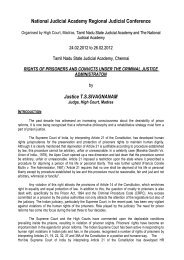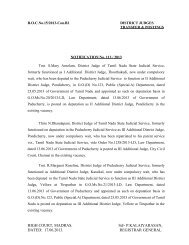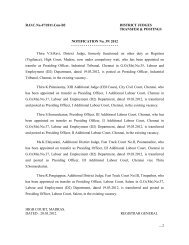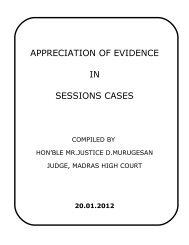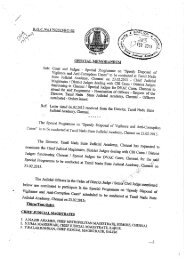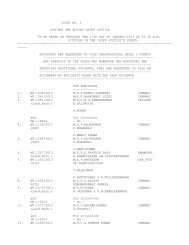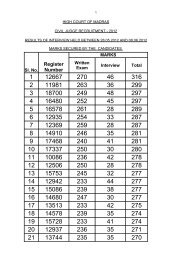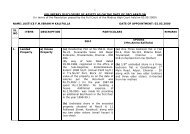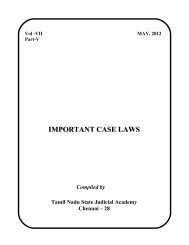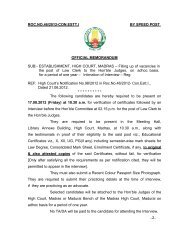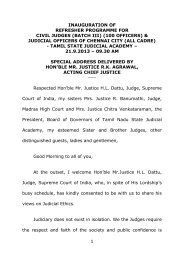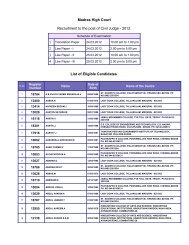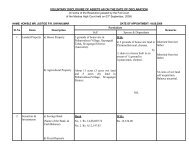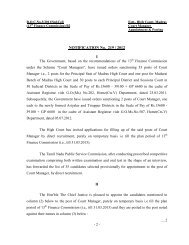IMPORTANT CASE LAWS - Madras High Court
IMPORTANT CASE LAWS - Madras High Court
IMPORTANT CASE LAWS - Madras High Court
You also want an ePaper? Increase the reach of your titles
YUMPU automatically turns print PDFs into web optimized ePapers that Google loves.
(2011) 3 MLJ 251<br />
K.P. Rajendran and Anr<br />
vs<br />
N.R. Nachmuthu and Ors<br />
Specific Relief Act (47 of 1963), Section 15 and 19 – Specific performance of contract – Party sought to be<br />
impleaded in suit not claiming any independent title but claiming title through one of parties – He is necessary<br />
party and liable to be impleaded as party to suit.<br />
Held: A combined reading of Sections 15 and 19 of the said Act, makes it clear that the parties to the contract and their<br />
representatives in interest can claim enforcement of the contract and the contract can be enforced against either party or<br />
any other person claiming under him by a title arising subsequently to the contract.<br />
In this case, it is admitted that after filing of the suit, the fourth respondent purchased the property from the other<br />
defendants and therefore, she is coming under Section 19(b) of the said Act. Further, under Section 19(b) of the said Act, if<br />
the subsequent purchaser is able to prove that he is transferee for value, who paid the money in good faith and without<br />
notice of the original contract, the specific performance of contract cannot be enforced against him and therefore, the<br />
subsequent purchaser is entitled to get the suit dismissed filed by the prospective purchaser under the agreement of sale, if<br />
he is able to prove that he is bona fide purchaser for value and he purchased the property without notice of the original<br />
contract. Therefore, the subsequent purchaser, who purchased the subject matter of the suit from one of the parties is a<br />
necessary party to have a binding decree against other parties.<br />
In the event of any decree being passed in favour of the revision petitioner, the fourth respondent has to execute<br />
sale deed along with the respondents 1 to 3 and therefore, in order to bind the fourth respondent, he is a necessary party.<br />
Without appreciating the same, the Lower <strong>Court</strong> relied upon the judgments in S.G. Kannappan v. S. Murugesan and Another<br />
(2001) 4 CTC 730: (2002) 1 MLJ 90, and Anil Kumar Singh v. Shivnath Mishra (1995) 3 SCC 147 and dismissed the<br />
application.<br />
2011 -2- L.W. 270<br />
S.R. Jayaraman and Ors<br />
vs<br />
C. Jothirlingam and Ors<br />
C.P.C., Order 33, Rule 1, Order 7, Rule 11, Practice and Procedure, Challenge to order of lower court<br />
granting permission of the <strong>Court</strong> to recognize the Power Agent to continue the suit – As per Order 33, Rule 1 of<br />
C.P.C., when an application filed is rejected by the <strong>Court</strong>, refusing to grant permission to the plaintiff to sue as<br />
indigent person, sufficient time has to be given to the plaintiff - Even after the dismissal of the application filed<br />
under Order 33, Rule 1 of C.P.C., the <strong>Court</strong> has to give further time to the plaintiffs to pay the <strong>Court</strong> fee in this case,<br />
that situation has not arisen.<br />
In this case, though the time was fixed by this <strong>Court</strong> respondents filed application under Order 33, Rule 1<br />
of C.P.C., seeking permission of the <strong>Court</strong> to continue the proceedings as informa pauperis – In that application<br />
before passing any order, the Stamp duty and the <strong>Court</strong> fee was paid – It cannot be stated that there is non<br />
compliance of Order 7, Rule 11 of C.P.C., which warrants dismissal or the rejection of the plaint.<br />
As per the residuary power given by the principal, the Agent is entitled to file the suit in respect of the<br />
permission given in the Power – No infirmity in the order of the <strong>Court</strong> below.<br />
It is admitted that this <strong>Court</strong> vide order 08.01.2008, passed in C.R.P(NPD) No. 1399 of 2006, directed the<br />
respondents to pay the <strong>Court</strong> fee under Section 40 of the said Act and granted two months time to pay the same. It is seen<br />
from the endorsement of the <strong>Court</strong> below that the plaint was returned to the respondents on 08.01.2008, with a direction to<br />
19



